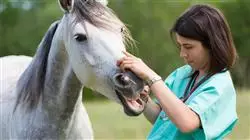University certificate
The world's largest faculty of veterinary medicine”
Introduction to the Program
A complete and total update in Dermatology, Neurology, Ophthalmology and Equine Endocrinology with the most complete and effective preparatory program in the online teaching market"

This Postgraduate diploma will review the most important aspects of dermatological, neurological, ophthalmological and endocrinological pathologies.
Due to the frequency of these pathologies, it is important to know in depth the different therapeutic options available. In the case of a skin laceration, the objective to be achieved, whenever possible, is the primary healing of the injured tissue. The prognosis of each case will depend on the structure involved, its location and degree of involvement.. The traumas with the worst prognosis are injuries affecting anatomical territories such as joints and tendons. Joint injuries are relatively frequent and have a poor prognosis; tendon lacerations show a lower incidence, with injuries affecting the flexor tendons presenting a serious prognosis. Both types of incidents, in the case of the sport horse, can mean the end of its sporting career and can even have a reserved vital prognosis. Good perioperative management and the use of an appropriate surgical technique will make it possible to preserve the patient's life and, in some cases, his or her return to sports practice at the previous level, since appropriate treatment will make it possible for the affected anatomical region to maintain normal functionality and for the esthetic results to be optimal.
Musculoskeletal infections in general, and those of bone and synovial structures in particular, pose a therapeutic challenge for the surgeon.
Viral and bacterial diseases encompass numerous pathologies that the equine clinician must know how to recognize and establish treatment guidelines. Fungal and parasitic diseases constitute the most frequent group of causes of skin alterations, being in many cases highly contagious between individuals, so it is important not only to identify these problems but also to establish adequate management guidelines to avoid their dissemination.
One of the most commonly observed skin problems today is allergy caused by mosquito bites and will be studied in depth in this module, along with another group of immune-mediated diseases. The topic of miscellaneous skin diseases includes those problems not covered in the previous sections, such as congenital skin problems.
Join the elite, with this highly effective preparatory specialization and open new paths to your professional progress"
This Postgraduate diploma in Equine Dermatology, Neurology, Ophthalmology and Endocrinology offers you the characteristics of a course of high scientific, teaching and technological level. These are some of its most notable features:
- Latest technology in online teaching software
- Highly visual teaching system, supported by graphic and schematic contents that are easy to assimilate and understand
- Practical cases presented by practising experts
- State-of-the-art interactive video systems
- Teaching supported by telepractice
- Continuous updating and recycling systems
- Self-regulating learning: full compatibility with other occupations
- Practical exercises for self-evaluation and learning verification
- Support groups and educational synergies: questions to the expert, debate and knowledge forums
- Communication with the teacher and individual reflection work
- Content that is accessible from any fixed or portable device with an Internet connection
- Banks of complementary documentation permanently available, even after the end of the training
A complete program that will allow you to acquire the most advanced knowledge in all the areas of intervention of the Equine Veterinarian"
Our teaching staff is made up of professionals from different fields related to this specialty. In this way, we ensure that we provide you with the training update we are aiming for. A multidisciplinary team of professionals trained and experienced in different environments, who will develop the theoretical knowledge in an efficient way, but, above all, will put at your disposal their practical knowledge from their own experience: one of the differential qualities of this specialization.
The efficiency of the methodological design of this Professional Master's Degree, enhances the student's understanding of the subject. Developed by a multidisciplinary team of e-learning experts, it integrates the latest advances in educational technology. This way, you will be able to study with a range of comfortable and versatile multimedia tools that will give you the operability you need in your training.
The design of this program is based on Problem-Based Learning: an approach that conceives learning as a highly practical process. To achieve this remotely, we will use telepractice: with the help of an innovative interactive video system, and learning from an expert, you will be able to acquire the knowledge as if you were actually dealing with the scenario you are learning about. A concept that will allow you to integrate and fix learning in a more realistic and permanent way.
With the experience of working professionals and the analysis of real cases of success, in a high-impact preparatory approach"

With a methodological design based on proven teaching techniques, this innovative course will take you through different teaching approaches to allow you to learn in a dynamic and effective way"
Why study at TECH?
TECH is the world’s largest online university. With an impressive catalog of more than 14,000 university programs available in 11 languages, it is positioned as a leader in employability, with a 99% job placement rate. In addition, it relies on an enormous faculty of more than 6,000 professors of the highest international renown.

Study at the world's largest online university and guarantee your professional success. The future starts at TECH”
The world’s best online university according to FORBES
The prestigious Forbes magazine, specialized in business and finance, has highlighted TECH as “the world's best online university” This is what they have recently stated in an article in their digital edition in which they echo the success story of this institution, “thanks to the academic offer it provides, the selection of its teaching staff, and an innovative learning method aimed at educating the professionals of the future”
A revolutionary study method, a cutting-edge faculty and a practical focus: the key to TECH's success.
The most complete study plans on the university scene
TECH offers the most complete study plans on the university scene, with syllabuses that cover fundamental concepts and, at the same time, the main scientific advances in their specific scientific areas. In addition, these programs are continuously being updated to guarantee students the academic vanguard and the most in-demand professional skills. In this way, the university's qualifications provide its graduates with a significant advantage to propel their careers to success.
TECH offers the most comprehensive and intensive study plans on the current university scene.
A world-class teaching staff
TECH's teaching staff is made up of more than 6,000 professors with the highest international recognition. Professors, researchers and top executives of multinational companies, including Isaiah Covington, performance coach of the Boston Celtics; Magda Romanska, principal investigator at Harvard MetaLAB; Ignacio Wistumba, chairman of the department of translational molecular pathology at MD Anderson Cancer Center; and D.W. Pine, creative director of TIME magazine, among others.
Internationally renowned experts, specialized in different branches of Health, Technology, Communication and Business, form part of the TECH faculty.
A unique learning method
TECH is the first university to use Relearning in all its programs. It is the best online learning methodology, accredited with international teaching quality certifications, provided by prestigious educational agencies. In addition, this disruptive educational model is complemented with the “Case Method”, thereby setting up a unique online teaching strategy. Innovative teaching resources are also implemented, including detailed videos, infographics and interactive summaries.
TECH combines Relearning and the Case Method in all its university programs to guarantee excellent theoretical and practical learning, studying whenever and wherever you want.
The world's largest online university
TECH is the world’s largest online university. We are the largest educational institution, with the best and widest online educational catalog, one hundred percent online and covering the vast majority of areas of knowledge. We offer a large selection of our own degrees and accredited online undergraduate and postgraduate degrees. In total, more than 14,000 university degrees, in eleven different languages, make us the largest educational largest in the world.
TECH has the world's most extensive catalog of academic and official programs, available in more than 11 languages.
Google Premier Partner
The American technology giant has awarded TECH the Google Google Premier Partner badge. This award, which is only available to 3% of the world's companies, highlights the efficient, flexible and tailored experience that this university provides to students. The recognition as a Google Premier Partner not only accredits the maximum rigor, performance and investment in TECH's digital infrastructures, but also places this university as one of the world's leading technology companies.
Google has positioned TECH in the top 3% of the world's most important technology companies by awarding it its Google Premier Partner badge.
The official online university of the NBA
TECH is the official online university of the NBA. Thanks to our agreement with the biggest league in basketball, we offer our students exclusive university programs, as well as a wide variety of educational resources focused on the business of the league and other areas of the sports industry. Each program is made up of a uniquely designed syllabus and features exceptional guest hosts: professionals with a distinguished sports background who will offer their expertise on the most relevant topics.
TECH has been selected by the NBA, the world's top basketball league, as its official online university.
The top-rated university by its students
Students have positioned TECH as the world's top-rated university on the main review websites, with a highest rating of 4.9 out of 5, obtained from more than 1,000 reviews. These results consolidate TECH as the benchmark university institution at an international level, reflecting the excellence and positive impact of its educational model.” reflecting the excellence and positive impact of its educational model.”
TECH is the world’s top-rated university by its students.
Leaders in employability
TECH has managed to become the leading university in employability. 99% of its students obtain jobs in the academic field they have studied, within one year of completing any of the university's programs. A similar number achieve immediate career enhancement. All this thanks to a study methodology that bases its effectiveness on the acquisition of practical skills, which are absolutely necessary for professional development.
99% of TECH graduates find a job within a year of completing their studies.
Postgraduate Diploma in Dermatology, Neurology, Ophthalmology and Equine Endocrinology
At TECH Global University our main objective is to provide the best possible training in the various fields that govern society today. For the veterinary field we have designed the Postgraduate Diploma course in Equine Dermatology, Neurology, Ophthalmology and Endocrinology as an excellent professional qualification opportunity. In our high quality program you will find a novel and updated curriculum, which will allow you to boost your different skills in the diagnosis, treatment and follow-up of the different equine pathologies related to the disciplines covered in this course.
Postgraduate in equine care 100% online
This TECH program has sophisticated thematic axes, through which you will acquire specialized knowledge in relation to surgical pathologies, skin problems, treatment alternatives, morphology and physiology, as well as other contents of utmost importance to improve your professional practice. In addition, it is worth mentioning that thanks to our 100% online modality, we can offer time and space benefits, which will be of great help when planning your activities outside the academic environment. Moreover, upon successful completion of the program you will receive a degree in Dermatology, Neurology, Ophthalmology and Equine Endocrinology, along with a prestigious international diploma.







